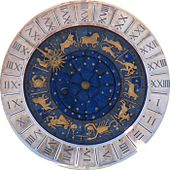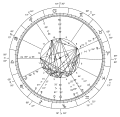Astrology and astronomy
| Astrology |
|---|
 |
| Background |
| Traditions |
| Branches |
| Astrological signs |
| Symbols |
Astrology and astronomy were archaically treated together (
operating as independent pursuits by the 18th century.Whereas the academic discipline of astronomy studies observable phenomena beyond the Earth's atmosphere,[2][3][4] the pseudoscience of astrology uses the apparent positions of celestial objects as the basis for divination.[5][6][7]
Overview
In pre-modern times, most cultures did not make a clear distinction between the two disciplines, putting them both together as one. In ancient
In the Hellenistic world, the Greek words 'astrologia' and 'astronomia' were often used interchangeably, but they were conceptually not the same. Plato taught about 'astronomia' and stipulated that planetary phenomena should be described by a geometrical model. The first solution was proposed by Eudoxus. Aristotle favored a physical approach and adopted the word 'astrologia'. Eccentrics and epicycles came to be thought of as useful fictions. For a more general public, the distinguishing principle was not evident and either word was acceptable. For the Babylonian horoscopic practice, the words specifically used were 'apotelesma' and 'katarche', but otherwise it was subsumed under the aristotelian term 'astrologia'.
In his compilatory work Etymologiae, Isidore of Seville noted explicitly the difference between the terms astronomy and astrology (Etymologiae, III, xxvii) and the same distinction appeared later in the texts of Arabian writers.[8] Isidore identified the two strands entangled in the astrological discipline and called them astrologia naturalis and astrologia superstitiosa.
Astrology was widely accepted in
Distinguishing characteristics

The primary goal of astronomy is to understand the
Astrologers practice their discipline
Astrologers believe that the position of the stars and planets determine an individual's personality and future. Astronomers study the actual stars and planets, but have found no evidence supporting astrological theories. Psychologists study personality, and while there are many theories of personality, no mainstream theories in that field are based on astrology. (The
Both astrologers and astronomers see Earth as being an integral part of the universe, that Earth and the universe are interconnected as one cosmos (not as being separate and distinct from each other). However, astrologers philosophically and mystically portray the cosmos as having a supernatural, metaphysical and divine essence that actively influences world events and the personal lives of people.[12] Astronomers, as members of the scientific community, cannot use in their scientific articles explanations that are not derived from empirically reproducible conditions, irrespective of their personal convictions.
Historical divergence
For a long time the funding from astrology supported some
Astronomy and astrology diverged over the course of the 17th through 19th centuries.
Also relevant here was the development of better timekeeping instruments, initially for aid in navigation; improved timekeeping made it possible to make more exact astrological predictions—predictions which could be tested, and which consistently proved to be false.[14] By the end of the 18th century, astronomy was one of the major sciences of the Enlightenment model, using the recently codified scientific method, and was altogether distinct from astrology.
Astrology and Zodiac Signs in the Modern Age
Astrology is considered by many philosophers and astronomers to be a false representation of the universe that individuals may use to associate the movement of the celestial bodies to their own ideas of human life and spirituality. Although many scholars consider astrology to be a pseudoscience, those that believe in zodiac signs and their meanings will argue the opposite, and these followers will support their claims with explanations for how and why the universe is connected to the human condition. The most popular and well-known form of astrology is seen in horoscopes that people are exposed to through social media, popular news outlets, and digital media. The horoscopes allow people interested in astrology and
| Constellation / Sign | Symbol | Unicode Character | Historic Start Date[18] | Historic End Date[18] | Constellation Visibility Date Start (2002)[19] | Constellation Visibility Date End (2002)[19] |
|---|---|---|---|---|---|---|
| Aries | ♈︎ | 21 March | 20 April | April 19 | May 14 | |
| Taurus | ♉︎ | 21 April | 21 May | May 15 | June 20 | |
| Gemini | ♊︎ | 22 May | 21 June | June 21 | July 20 | |
| Cancer | ♋︎ | 22 June | 23 July | July 21 | August 10 | |
| Leo | ♌︎ | 24 July | 23 August | August 11 | September 16 | |
| Virgo | ♍︎ | 24 August | 23 September | September 17 | October 31 | |
| Libra | ♎︎ | 24 September | 23 October | November 1 | November 24 | |
| Scorpio | ♏︎ | 24 October | 22 November | November 25 | November 29 | |
| Ophiuchus* | ⛎︎ | N/A | N/A | November 30 | December 17 | |
| Sagittarius | ♐︎ | 23 November | 21 December | December 18 | January 19 | |
| Capricorn | ♑︎ | 22 December | 20 January | January 20 | February 16 | |
| Aquarius | ♒︎ | 21 January | 19 February | February 17 | March 11 | |
| Pisces | ♓︎ | 20 February | 20 March | March 12 | April 18 |
* Scorpio is not visible through the full period. Instead, the constellation Ophiuchus is visible during this time and so is a proposed 13th zodiac sign.[16]
See also
- History of astronomy
- History of astrology
- Natal chart
- Panchangam
- The Sophia Centre
- Treatise on the Astrolabe
References
- ISBN 978-0521403405.
- ^ "astronomy – Britannica Concise". Concise.britannica.com. Archived from the original on 3 February 2008. Retrieved 20 November 2011.
- ^ "Ontario Science Centre: Glossary of Useful Scientific Terms". Ontariosciencecentre.ca. Retrieved 20 November 2011.
- ^ "Outer Space Glossary". Library.thinkquest.org. Archived from the original on 7 October 2011. Retrieved 20 November 2011.
- ^ "astrology – Britannica Concise". Concise.britannica.com. Retrieved 20 November 2011.
- ^ "The Skeptic Dictionary's entry on astrology". Skepdic.com. 7 February 2011. Retrieved 20 November 2011.
- "Activities With Astrology". Astrosociety.org. 5 December 1985. Retrieved 20 November 2011.
- "An Encyclopedia of Claims, Frauds, and Hoaxes of the Occult and Supernatural". Randi.org. Archived from the original on 12 September 2012. Retrieved 20 November 2011.
- Kruszelnicki, Karl S. (16 December 2004). "Astrology or Star Struck". Australia: ABC. Retrieved 20 November 2011.
- ^ "Astrology". Bad Astronomy. 2 July 2011. Retrieved 20 November 2011.
- S2CID 143941055.
- ^ "Astrology Terminology Dictionary". Skyviewzone.com. Archived from the original on 12 November 2016. Retrieved 20 November 2011.
- Bibcode:1984asas.book.....F. Retrieved 16 November 2016.
- ^ "The Big Bang and the Expansion of the Universe". Atlasoftheuniverse.com. Retrieved 20 November 2011.
- ^ "Realities in Astrology". Wisdomsgoldenrod.org. Archived from the original on 2 October 2011. Retrieved 20 November 2011.
- ^ Westman argued that his interest was indeed astrological and points that it would be an historical exception if he did not practice astrology; however there is just an indirect mention on record, see Westman R. (2011), The Copernican Question, University of California Press
- ^ "In our time: Astrology". BBC. 14 June 2007. Retrieved 20 November 2011.
- S2CID 147050929.
- ^ a b c Kaler, James B. (24 January 2020). "Why your zodiac sign is probably wrong". The Conversation. Retrieved 4 December 2022.
- S2CID 147050929.
- ^ a b Jeremy B. Tatum, "The Signs and Constellations of the Zodiac Archived 2023-06-01 at the Wayback Machine", Journal of the Royal Society of Canada, 104 (2010), 103--104.
- ^ ISBN 978-0-521-49918-7.
Further reading
- Eade, J. C. (1984). The Forgotten Sky: A Guide to Astrology in English Literature. Oxford: Clarendon Press; New York: Oxford University Press. ISBN 978-0-19-812813-7.
- Losev, A. (2012). "'Astronomy' or 'astrology': a brief history of an apparent confusion". Journal of Astronomical History and Heritage. 15 (1): 42–46. Bibcode:2012JAHH...15...42L.
- North, John David (1988). Chaucer's Universe. Oxford: Clarendon Press.
- "What's the difference between astronomy and astrology?". American Astronomical Society. Archived from the original on 1 July 2014. Retrieved 17 August 2014.

